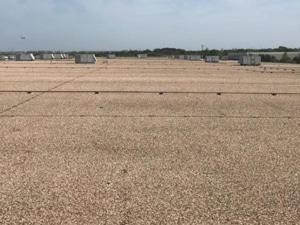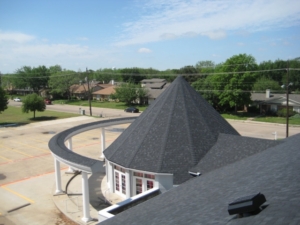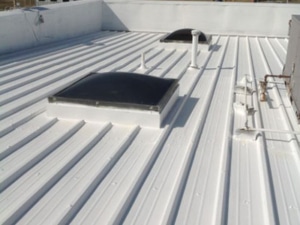Commercial Roofing
The roof that sits atop your commercial or industrial property likely gets minimal thought during your day. That is, until disaster strikes. A roof that leaks can cause damage to inventory, assets, and cause harm to your customers and employees. On top of that, if not handled in a timely manner, you could be facing long term structural damage.
The good news is that there’s no need to worry! The Ryerson Roofing team is here to provide you with trusted commercial and industrial roofing solutions. We will work with you to quickly resolve your existing roofing dilemmas, then create a plan to stay on top of long-term maintenance.



Commercial Roofing Services
When your facility is in need of a trusted contractor, Ryerson Roofing is here for you. We work with clients throughout Grapevine, Texas and the surrounding areas, providing them with superior roofing solutions that are customized to each roofing system. Our staff is comprised of a team of experienced and skillful technicians who can work with every substrate, including:
- Single-Ply Systems
- EPDM
- TPO
- PVC
- Modified Bitumen
- Metal
- Spray Foam
- Built Up
- Roof coatings
- And more!
Commercial Roofing Types
Coated Roofing Systems
Extending the life of a roof, a roof coating may be the most effective, economical solution. Acrylic coatings can be installed over single-ply membranes, built-up, modified bitumen, metal, polyurethane foam, concrete, board stock, asphalt, and more. The resulting roof is monolithic, 100% adhered to the substrate with no seams, fasteners, or adhesives. It will have high reflectivity and emissivity ratings in support of Cool Roof initiatives with resulting energy savings. What’s more, fluid-applied coatings are normally expenses as a first-year maintenance cost from your taxes rather than capitalized, which can result in significant tax benefits for your company.
Built-Up Roofing Systems
This traditional roofing system incorporates the application of multiple layers of insulation boards with the base layer mechanically attached to the substrate with subsequent layers placed in hot asphalt. Multiple plies, alternating fiberglass felts, and hot asphalt, are then applied. The system is finalized with a flood coating hot asphalt, hot asphalt & gravel, or a modified cap sheet.
BUR membranes, referred to by the acronym BUR, have been in use in the U.S. for more than 100 years. These roof systems are commonly referred to as “tar and gravel” roofs. BUR systems generally comprise alternating layers of bitumen and reinforcing fabrics that create a finished membrane.
EPDM Roofing Systems
EPDM, Ballasted – The ballasted system presents an easy, economical roofing solution for buildings that can accommodate an average ballast weight of 10 to 12 psf. Because the system is easy to install, it’s ideal for applications where eventual changes in building height or contours are envisioned.
EPDM, Mechanically Attached – This system presents a lightweight, cost-effective option if you wish to limit the weight load on the building or to reinforce an existing roof. Insulation, when necessary, is mechanically attached to the deck, with the membrane affixed at set intervals using linear attached batten strips to protect against wind uplift.
EPDM, Fully Adhered – This system is especially recommended for applications over an existing substrate where the use of mechanical fasteners is undesirable, or unfeasible. The insulation is installed using hot asphalt, with the membrane fully adhered to the secure insulation. The system may also be installed over insulation that is attached using conventional fastening methods where applicable. It’s also ideal for special configurations such as domes and barrels.
TPO: Thermoplastic Polyolefin Roofing Systems
TPO, Mechanically Attached Roof – This system presents a lightweight, cost-effective option if you wish to limit the weight load on the building or to reinforce an existing roof. Insulation, when necessary, is mechanically attached to the deck, with the membrane affixed at set intervals using linear attached batten strips to protect against wind uplift.
TPO, Fully Adhered Roof – This system is especially recommended for applications over an existing substrate where the use of mechanical fasteners is undesirable, or unfeasible. The insulation is installed using hot asphalt, with the membrane fully adhered to the secure insulation. The system may also be installed over insulation that is attached using conventional fastening methods where applicable. It’s also ideal for special configurations such as domes and barrels.
A thermoplastic polyolefin roof (TPO) has become a very popular option, especially among commercial building owners.
PVC: Polyvinyl Chloride Roofing Systems
PVC, Mechanically Attached – This system presents a lightweight, cost-effective option if you wish to limit the weight load on the building or to reinforce an existing roof. Insulation, when necessary, is mechanically attached to the deck, with the membrane affixed at set intervals using linear attached batten strips to protect against wind uplift.
PVC, Fully Adhered – This system is especially recommended for applications over an existing substrate where the use of mechanical fasteners is undesirable, or unfeasible. The insulation is installed using hot asphalt, with the membrane fully adhered to the secure insulation. The system may also be installed over insulation that is attached using conventional fastening methods where applicable. It’s also ideal for special configurations such as domes and barrels.
PVC, or polyvinyl chloride, roofing is composed of two layers of PVC roof material with polyester acting as a reinforcement between the layers. The layers also include additives that make the material UV-stable and flexible, while also preventing curing. Like EPDM and TPO, it is lightweight.
Modified Bitumen Roofing Systems
APP Modified Bitumen – This membrane is comprised of high-quality asphalt that has been specially compounded with Atactic Polypropylene polymer to enhance tensile strength and resistance to foot traffic. Available in a smooth or granular surface, in an assortment of colors, this system is installed easily and efficiently with a propane torch or cold adhesives and a trowel.
SBS Modified Bitumen – This membrane is formulated with high-quality asphalt that has been specially modified with Styrene-Butadiene-Styrene polymer to improve elongation, low-temperature flexibility, and fatigue residence. This system is available in either smooth or granular surface in an assortment of colors. This system is installed easily and efficiently with hot asphalt, propane torch or cold adhesives, and a trowel.
Metal Roof System
Standing seam, R-panel, or corrugated metal panels are mechanically attached to the existing structural purlins. These systems are generally installed in place of an existing metal roof system.
To learn more about how Ryerson Roofing can help your facility, please call our office at 817-756-7686.